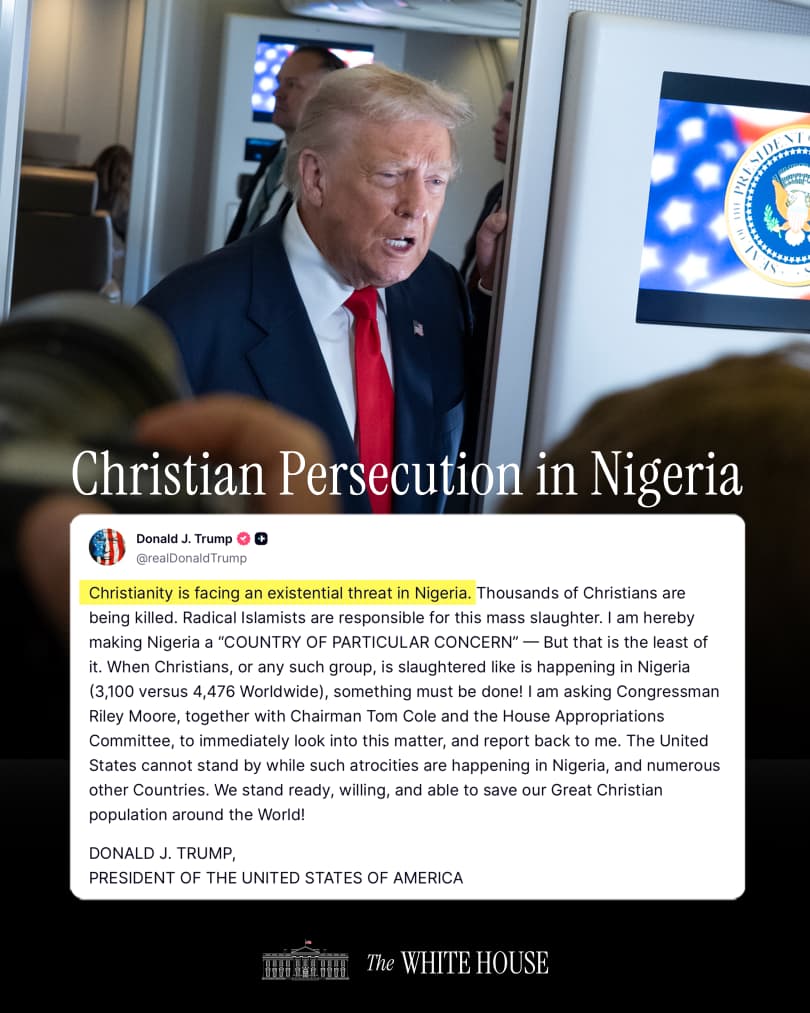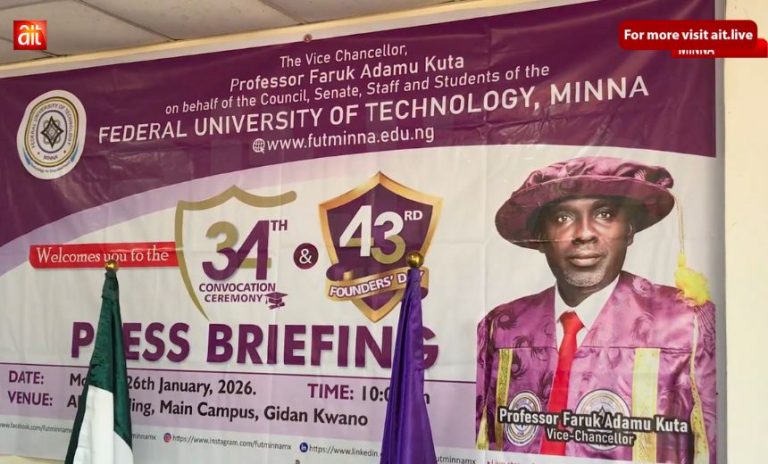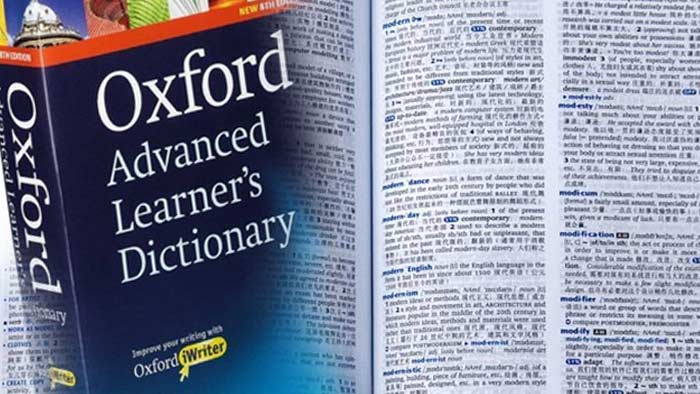In a move that has drawn international attention, U.S. President Donald J. Trump has formally designated Nigeria as a “Country of Particular Concern” (CPC) following what he described as the “mass slaughter of Christians” across various regions of the country.
President Trump made this declaration through a statement released on his official social media platform, Truth Social, condemning what he called a “humanitarian tragedy and religious massacre” taking place in Nigeria. He emphasized that the United States “will not sit idly by while thousands of innocent Christians are being killed by radical Islamists.”
According to Trump, the situation in Nigeria has reached an alarming level, requiring urgent international response and accountability.
Trump’s Statement and Immediate Actions
President Trump’s statement reads in part:
“Thousands of Christians are being killed in Nigeria. Radical Islamists are responsible for this mass slaughter. We cannot stand by while such atrocities are happening in Nigeria and numerous other countries. We stand ready, willing, and able to save our great Christian population around the world.”
He further revealed that he has directed Representative Riley Moore (R-West Virginia) and Representative Tom Cole (R-Oklahoma) to conduct a full investigation into the killings and present a report to the House Appropriations Committee.
This move signals that the Trump administration is taking a renewed and aggressive stance on global religious freedom, with Nigeria now under direct diplomatic scrutiny.
Understanding the “Country of Particular Concern” Designation
The Country of Particular Concern (CPC) status is the highest classification issued by the U.S. State Department under the International Religious Freedom Act (IRFA). It is reserved for nations that are found to have committed or tolerated “systematic, ongoing, and egregious violations of religious freedom.”
This designation can carry significant diplomatic implications, including targeted sanctions, travel restrictions, or suspension of certain forms of U.S. assistance. It effectively places Nigeria on a global watchlist for religious persecution and human rights violations.
The Religious Violence Crisis in Nigeria
Nigeria has, for years, struggled with religiously motivated attacks, particularly in the northern and central regions. Groups such as Boko Haram and Islamic State West Africa Province (ISWAP) have targeted Christian communities, razing villages, burning churches, and killing thousands.
Rights groups have also highlighted the deadly herder-farmer clashes, often described as ethnoreligious conflicts, where both Christian farmers and Muslim herders have suffered losses.
A global watchdog report from Open Doors International revealed that nearly 70 percent of Christians killed worldwide for their faith in 2024 were in Nigeria, making the country the most dangerous place on earth to be a Christian.
Despite various government efforts, attacks continue unabated in states such as Benue, Plateau, Kaduna, and Borno, leaving thousands displaced and traumatized.
Nigerian Government’s Position
The Nigerian government has strongly rejected claims of a Christian genocide, describing the violence as a complex mix of terrorism, criminality, and ethnic tensions that affect both Christians and Muslims.
Officials maintain that the government has continued to intensify military operations against insurgents and bandits, alongside community peacebuilding initiatives.
A senior government spokesperson emphasized that:
“Nigeria’s conflict is not a war against any religion. Both Christians and Muslims have been victims of terrorism and communal violence. The government remains committed to protecting every Nigerian citizen.”
However, critics argue that the government’s response has been slow and insufficient, allowing extremist groups to flourish in several regions.
Mixed Global Reactions to Trump’s Declaration
President Trump’s decision has provoked mixed global reactions, ranging from applause by Christian advocacy groups to caution from international observers.
- Christian advocacy groups in both Nigeria and the United States hailed the move, describing it as a long-overdue recognition of the suffering of Nigerian Christians. Many expressed optimism that this will prompt stronger international pressure on Nigeria to act decisively.
- Human rights experts, however, warned that the designation could oversimplify Nigeria’s multifaceted crisis. They noted that while Christian communities have been heavily targeted, many Muslim populations have also endured violent attacks by the same extremist factions.
- Diplomatic analysts have noted that Trump’s renewed focus on Nigeria’s religious crisis marks a shift from previous U.S. policy under the Biden administration, which had removed Nigeria from the CPC list in 2021.
Historical Context: Nigeria and the CPC List
Nigeria was first listed as a Country of Particular Concern in 2020, during President Trump’s earlier administration, over serious religious freedom concerns. However, the Biden administration delisted Nigeria in 2021, a move that sparked widespread criticism from international Christian organizations.
By reinstating the designation in 2025, President Trump has effectively reasserted his administration’s strong stance on global religious freedom and reaffirmed U.S. commitment to protecting persecuted faith communities.
Potential Implications for Nigeria
- Diplomatic Pressure and Scrutiny:
The U.S. may demand clearer actions from Nigeria regarding the protection of religious minorities and accountability for perpetrators. - Impact on International Aid:
CPC classification can influence U.S. funding and development partnerships, possibly leading to conditional aid or withheld assistance. - Religious Sensitivity:
The designation might heighten religious tensions within Nigeria, especially if extremists attempt to exploit the announcement for propaganda. - Global Accountability:
The move could encourage other Western nations to review their diplomatic stances toward Nigeria, leading to broader international engagement on human rights issues.
Analyst Perspectives
Experts say Trump’s move is both a moral and strategic statement. While it highlights real humanitarian concerns, it also underscores the administration’s broader commitment to religious freedom as a cornerstone of U.S. foreign policy.
Security analysts caution, however, that resolving Nigeria’s religious crisis requires addressing root causes — including poverty, governance failures, and access to justice — rather than focusing solely on religious identity.
They warn that framing the crisis purely as Christian persecution could risk oversimplification and further polarization within Nigerian society.
Conclusion: A Renewed Global Focus on Nigeria’s Religious Freedom
President Donald Trump’s designation of Nigeria as a “Country of Particular Concern” has reopened critical conversations about religious violence, human rights, and international responsibility.
For millions of Christians in Nigeria, this decision represents hope for recognition and global advocacy after years of silence. For Nigeria’s government, however, it poses a diplomatic challenge — one that demands both decisive internal reforms and careful external engagement.
As the world watches closely, the effectiveness of this move will depend on whether it leads to real action, improved protection for citizens, and genuine peace across all religious divides.



